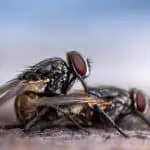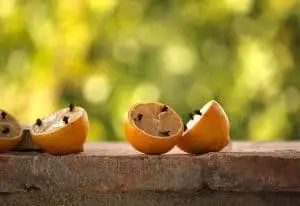Everyone agrees, flies are unwelcome pests. They come out of nowhere to dampen the mood of our backyard pizza parties, disrupt our baking endeavors, and they drive our cats to attempt ill-fated leaps!
While it may seem that flies appear randomly, their perfectly timed arrival is anything but random. Flies have built-in stimuli that attract them to head toward certain scents while some aromas will have them heading for the hills.
What smell do flies not like? Flies don’t like the smell of highly concentrated aromas. Fragrances that we associate with smelling clean or disinfected, such as lemon and peppermint, are examples of smells that flies don’t like.
In this article, we’ll be exploring the smells you should avoid, and even more scents that you can use strategically to keep annoying flies from ruining your day.
Seek First to Understand: Flies
Flies are annoying. But that’s not the only reason to keep them away. Flies are generally seen as a sign of filth and poor hygiene, and they can also spread disease. As flies travel from surface to surface, they often pick up pathogens and then spread them.
For instance, a fly could be rummaging around a trash can and then land on your food, effectively infecting your food with the germs from the trash. Flies also feed on highly unsanitary substances, such as manure, and can pick up disease-causing pathogens and spread them to humans.
According to the World Health Organization, house flies can transmit diseases as serious as typhoid and cholera, along with a number of other infections. As such, keeping flies away and understanding what attracts them is an important step in protecting your health.
Flies have an excellent sense of smell and can pick up odors from a distance far greater than we are capable. They do this with nerve cells located in their olfactory hairs on their antennae. The odors these cells pick up can attract flies to the scent’s source. If it feels like flies are more attracted to you than others, check out our in-house article: Why do flies pick me?
What smells attract flies?

So, which scents are the ones that will bring flies buzzing into your space? The main smell that attracts flies is the smell we call “rot.” This includes things like decaying food, manure, and garbage.
If you have old rotting fruit lying around your kitchen or garbage cans full of decaying meat or feces, flies can be brought buzzing your way. Flies are enticed by these odors for two main reasons: food sources, and environments for breeding.
The Scent of Food as a Food Source
One of the main reasons flies will gravitate towards a scent is because it indicates a food source. Flies feed on decaying matter, and the gruesome odor rotting food gives off brings the flies in.
For house flies, this ranges from rotting meat to fecal matter. House flies are also attracted to the scent of sugary substances, such as nectar and rotting fruit. Essentially, anything that gives off a scent of food will bring in the flies.
Drosophila – AKA: Fruit flies are attracted to rotting fruit in particular, hence their nickname. Sugary substances like alcohol and soda can bring in fruit flies looking for something to eat as well. A scientific study conducted on fruit flies also found that they are attracted to fruit-bearing plants such as mango and papaya, which they land on and feed off of the flowers.
The Scent of Food as a Breeding Place

Another reason flies are attracted to the aroma of decay is because it indicates a prime spot for breeding. As materials decay, they create the conditions flies prefer to breed in.
Female flies will lay their eggs in the soft decaying material, and when those eggs hatch, the rotting material serves as a source of food for the larvae.
Musca Domestica also known as Common House flies tend to prefer things like feces and decaying meat as locations to lay their eggs. They can also lay their eggs in garbage.
Fruit flies, again like their name suggests, lay their eggs in fruits and vegetables. They can also breed in other environments such as moist garbage cans. The scents given off by the decaying materials like fruits, vegetables, meat, and feces can attract flies looking for a place to breed. Worse yet, the eggs they lay can hatch, leading to even more of an infestation. –ALWAYS WASH FRUITS AND VEGGIES!
You’ll want to avoid the aromas of rot and decay to prevent more flies from popping up.
What smells will keep flies away?
Knowing what smells to avoid will help prevent flies, but knowing what smells flies hate will also help keep them at bay. Fortunately, there are a number of aromas that repel flies. These include:

- Essential oils: Lemongrass and peppermint, to name a few, give off aromas that repel flies naturally. These can be used in sprays that will deter flies.
- Vodka: The scent of vodka is also unpleasant to flies. Like the essential oils, vodka can be used to create sprays to keep flies away.
- Cloves: Cloves also give off a scent that flies hate, particularly house flies. The cloves can be stuck inside a lemon to create an aroma that wards off flies.
- Cinnamon: While the scent of cinnamon is pleasant to us, flies hate it. Using it as an air freshener can help keep the pests at bay.
- Camphor, which is commonly used to deter moths (via mothballs) also produces a scent that helps discourage flies from entering your space.
A number of herbs that produce fly-repelling odors can also be grown and kept in homes and gardens, or potted plants near a patio. A few examples of these are:
- Basil: A plant that smells great to us, but not to flies. It repels many other insects as well, such as mosquitos, and is great for cooking.
- Lavender: Another plant that gives off a strong fragrance. The flowers can also be harvested, dried and then placed around your home, keeping the insects at bay.
- Mint: Plants in the mint family ward off flies, along with other pests like mice and ants. Extracting the oils in mint plants can also allow you to further unlock their potency.
- Bay Laurel: Able to be utilized for their aromas as either freshly-growing or dried, bay laurel’s leaves produce a scent unpleasant to flies. If you choose to grow it, you’ll need to bring it inside for the winter, as these plants don’t do well in the cold.
- Rosemary: A plant that repels not only flies, but also mosquitoes and cats. This plant is capable of growing year-round with the proper care, and is great for adding more flavor to your dishes.
Adding a few of these plants to your home will not only help keep the flies from buzzing around, but they can also produce an aroma pleasant to us. And, as an added bonus, many of these fly-repellent plants are great for cooking!
Other Ways to Keep Flies Away
While creating fly-deterring aromas is a great way to avoid an infestation of these pests and create an environment that smells great to you, it’s a good strategy to avoid attracting the flies in the first place.
Keep your space sanitary and dispose of rotting materials that produce those fly-attracting odors. Flies have such a short lifespan. If a fly can’t breed and can’t feed then they have no reason to waste their precious time.
Use trash cans with good lids. Open air trash cans are irresistible to flies. Fix all window and door screens. Teach kids the importance of closing the door every time the enter and exit the home.
By practicing good habits and using fly-repelling scents, you’ll be protecting yourself and your home from the buzzing, disease spreading pests.
